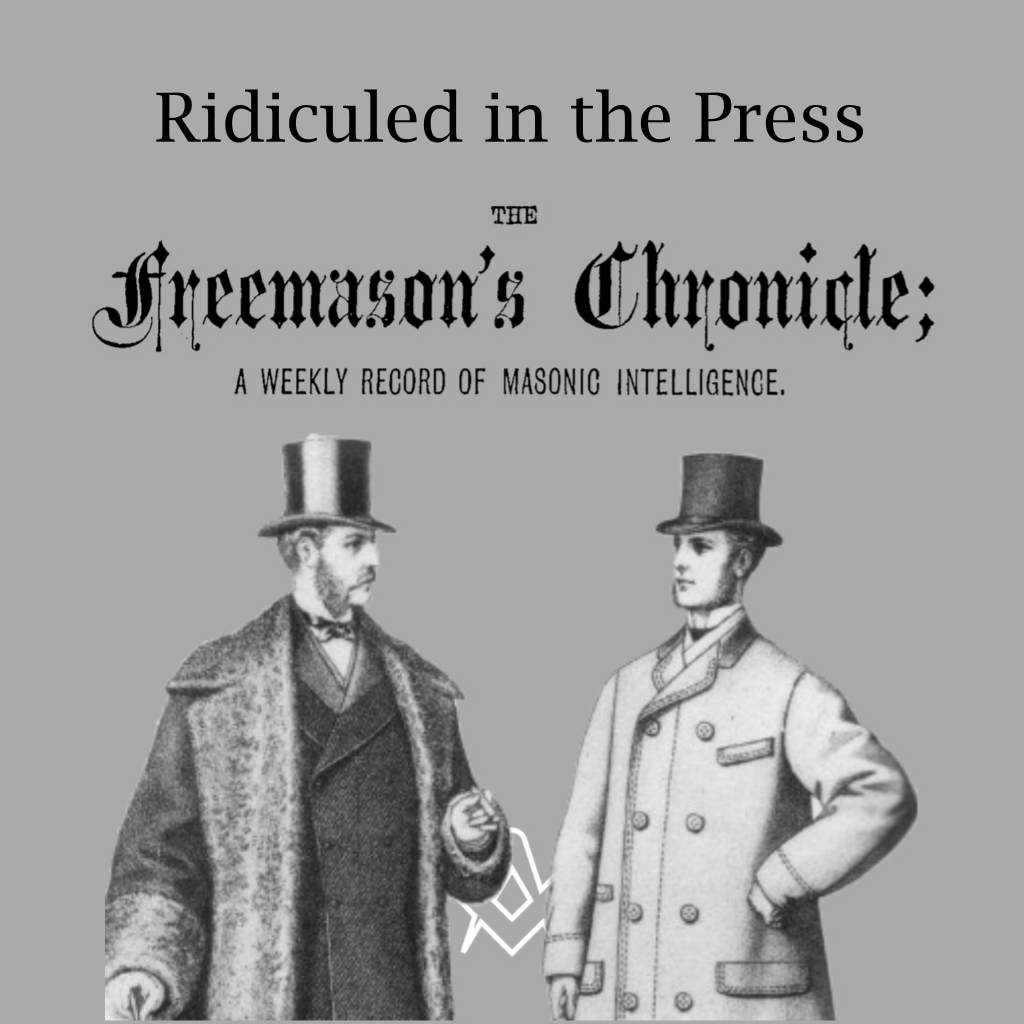We have republished two press reports from May 1875 covering the Installation of the Prince of Wales as Grand Master, which took place at the Royal Albert Hall on 28 April 1875.
The first report is from The Freemason’s Chronicle dated 8 May 1875, who have taken a report of the event by the Saturday Review 1 May 1875 very badly and set about admonishing their reporting in a very public way.
Then we follow up with the said report of the event in the Saturday Review. I leave it to you to consider if the push back is fairly warranted.
– Editorial
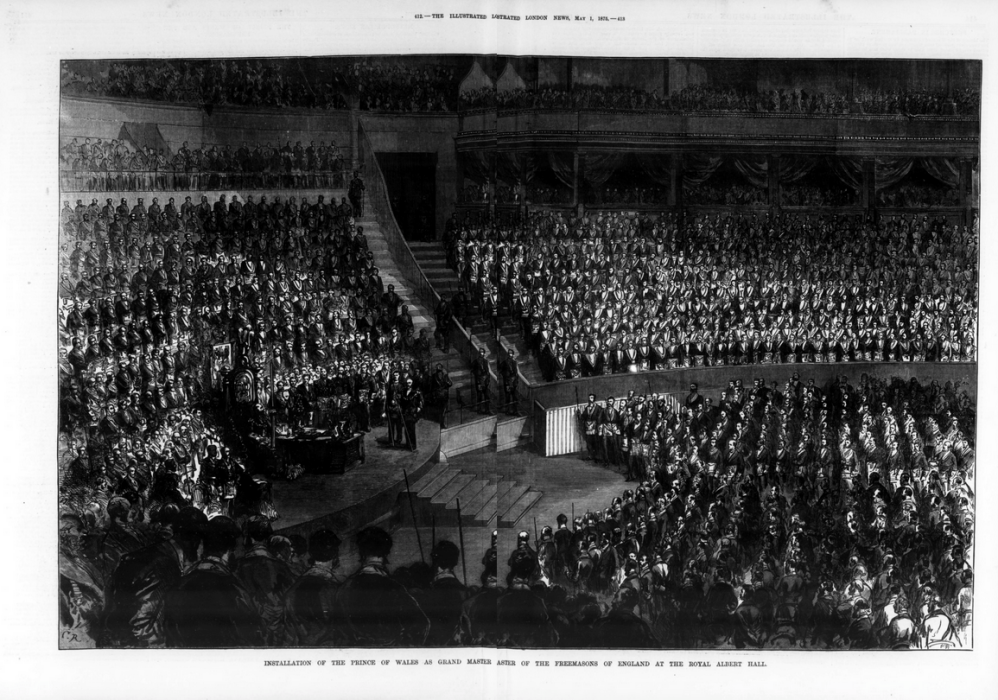
Installation of the Prince of Wales as Grand Master of the Freemasons of England at the Royal Albert Hall.
IMAGE LINKED: Illustration for The Illustrated London News, 1 May 1875.
Ridicule has been somewhat illogically described as the test of truth. If it were so, Freemasonry ought to have perished long since.
Some of the great masters of satire have exhausted the resources of their art upon it: it has been laughed at for its mysteries, for its symbolism, and for the uniform in which the brethren, it is supposed, love to deck themselves.
Carlyle has sneered at its “pasteboard temples, and its tinsel paraphernalia,” and the giants of the press have often gone out of their way to give the Order a sly dig.
Yet, in spite of ridicule, Freemasonry flourishes, and nobody seems a bit the worse for all the funny sayings or harsh things which have been flung at the Craft.
Masons are not proverbial for being thin skinned, and if a professional jester chooses to laugh, like a yokel through a horse collar, at what he does not understand, they are quite willing to permit him to grin to his heart’s content.
Our contemporary, the Saturday Review, in pursuance of its usual policy, has been making very merry over the Installation Ceremony, which has come like a godsend to a journal that has had little or nothing to laugh at since the Conservatives came into office.
The Saturday Review, of course, is nothing if it is not funny, incisive and bitter. Its writers are the literary Octopi of the journalistic world, and few things of any value escape the grasp of their envenomed tentacles.
Experts accustomed to its style arc probably well aware that the invective of the Saturday Review is to be regarded as praise.
It rarely attacks any thing which is not worth attacking, and its vigorous abuse of a work of fiction, for example, is regarded by the publishing world as so much commendation.
Whenever it abuses a new book the volume is sure to sell, and in America its adverse criticisms are regularly looked for by the publishing houses, which immediately reproduce any English work that is so fortunate as to draw the fire of this wonderful gall-squirt of literature.
Nothing is so fatal as its praise. If it had condescended to speak in terms of high commendation of Masonry, we, for our own part, should seriously have considered the propriety of retiring from active Masonic duty.
But since it has nothing but abuse to bestow upon us we are assured, if we ever needed any assurance of the kind, that Masonry is a noble institution, and well worthy of the countenance and support of all right thinking men.
It has the effrontery to tell its readers that Masons are silly persons, who are much addicted to the wearing of collars, emblems and aprons, and it adds that they are afraid to display these gorgeous decorations in public lest the little boys should laugh at them.
In justice to the Saturday Review we may perhaps remark that in this groundless assertion the skilled reader will find abundant proof of its loyalty to the reigning house.
If it had called us wise, we might fairly have inferred, on the principle of contraries, that it held us to be the fools it affects to believe us to be.
But, bearing in mind its peculiar idiosyncrasies, we may venture to proclaim that it does not really mean to insult His Royal Highness the Grand Master, and that it entertains the most profound and servile respect for his august brothers, who, in common with himself, have not disdained to enter the ranks of the so-called sill y people who wear aprons and collars in the strict seclusion of the Lodge.
The Saturday Review, in fact, knows very well that some of the wisest and most august persons in the realm are members of the Fraternity.
It is painfully conscious that its praise is regarded by all honest men as libellous; and with a forbearance which does it infinite honour, it restrains its first impulse, and in generous recognition of true worth it opens the stores of its vocabulary of abuse and liberally sprinkles the best men in this country with a proper allowance of vinegar and gall.
If it had condescended to patronise, we honestly believe that no conspicuous Mason could have survived the shame of the thing; but since it is only venomous, the humblest brother may take courage and breathe freely.
We are spared the last and greatest humiliation that could befall the Order, and may yet look forward to many years of honourable usefulness.
The Saturday Review grins heartily over its assumption that a Society pledged to secrecy should have taken the trouble to invite all the world, through the medium of the newspapers, to be present at the Installation.
It assumes that after all the secret of Masonry is no secret, and that the’ awful veil which has hitherto enshrouded the Order has been lifted in the face of an eager and disappointed world, and the world has learned nothing. This is indeed partly true.
Just so much of the proceedings of last week have been reported as could with propriety be reported to the public, and the Saturday Review knows as well as anybody that the mystic portions of the ceremonial were not touched upon by the Masonic Members of the Press who were present.
If we could possibly suspect it of a sordid desire to obtain an insight into these mysteries without due initiation, we might fairly condole with it upon its disappointment.
We cannot however suspect it of anything which would so ill become the cultured prigs of its staff, and we are therefore constrained to say that its rather trite reflections upon the secrets of the Order are only laboured efforts at fun.
We may have our own opinion as to the quality and flavour of the jests it has fired off, but its good intentions are too patent to be misunderstood, and if we venture upon a word of serious reply we do so merely in consideration of the weakness of such of our readers as may not be fully acquainted with this brilliant specimen of English journalism.
It has been our sad lot to study its pages for some years past, and we bear willing testimony to the trying efforts it has made from week to week to keep up its very questionable reputation.
When everything that is good and noble in this world has been roundly abused, our old friend will have fulfilled its mission, and will then perchance sink peacefully into a benevolent old age. We trust this dreadful event is still distant.
The Saturday Review in the character of a kindly and impartial mentor would be too terrible an infliction for any sane man to endure.
It must however look out for its laurels, brilliant young rivals are already in the field, and we fancy that its mixture of vinegar and gall has lost much of its old pungency.
Some of our brethren who imagine a reviewer’s words have the usual current value, may possibly be annoyed at the assertion that we are fond of childish parade, and that there is nothing solid or valuable in Masonry .
We ourselves take this statement as a compliment, and, for the benefit of weak brethren only, we remind our critic that an Order which disburses upwards of £30,000 annually in Masonic Charity really devotes some of its leisure to serious work.
We may further add that if it were worth while to wear the insignia of the Order in public, or to indulge in any parade of our principles, the brethren would by no means be afraid of exciting the laughter of fools.
The leaders of Masonry, however, wisely leave displays of this kind to the Friendly Societies, and are too seriously intent upon the solid business of the Craft to care for the public show of finery.
We are all quite aware of the fact that people can be charitable and good in plain every-day attire, and we may inform the Saturday Review, if it really needs the information, that a great portion of the vast sum which is annually devoted to charitable purposes, is subscribed without any of the official displays which have called forth so many of its compliments.
Our chief dignitaries, whose titles have afforded the Saturday Review so much simulated amusement, are men who would be the first to scout and laugh to scorn any useless parade of ribbons and medals; and the fact that they condescend to wear the insignia of the Order on State occasions must be regarded as sufficient proof that some solid meaning underlies them.
If Masons are all fools, some of the illustrious men whose names adorn the page of history should have worn the cap and bells which the Saturday Review so gracefully holds up to our vision.
Frederick the Great, the Duke of Wellington, Archbishop Howley, to say nothing of noblemen and gentlemen of the highest culture, were members of the Craft.
It is really kind of the Saturday Review to take off the headdress which fits it so well, and offer it as a suitable adornment for our silly heads.
We really cannot be so cruel as to rob it of an article of attire for the exclusive privilege of wearing which it has laboured so strenuously during the last twenty years.
It would be nothing without the congenial jingle of its own bells, and if it still fancies that its fool’s baton is the omnipotent wand of a great literary authority, we shall not be harsh enough to destroy the illusion.

The Saturday Review of Politics Vol. 39 – May 1, 1875
THE MASONIC FESTIVAL.
The Freemasons have met, paraded, cheered the Prince of Wales, dined together in various circles of mysterious honour, and gone home happy, as far as one can judge from the melodious utterances which were heard in the streets adjoining the hostelries where they broke up for the night.
Some of them perhaps may not have been quite so happy next morning, but heroic natures have consolation for headaches in the proud consciousness of great duties performed at any personal sacrifice.
A published account of the hidden ceremonies of a fraternity sworn to secrecy obviously carries its own comment with it, and it is to be feared that the newspapers must have suborned agents who, if the old rules of this society were in force, would by this time have been found strewn about with daggers in their hearts, each with a paper attached to it inscribed “A warning to traitors.”
If these miscreants have any chance of a trial before execution, the best plea we can suggest for them is that the more the secret practices of the Freemasons are exposed the less likelihood will there be of any mystery being discovered.
Possibly, however, it may turn out that the reports in the papers were simply fiction.
Any one who happened to be in the South Kensington district after noon on Wednesday last (28th April 1875) would have seen streams of respectable-looking men clad in black, with white ties which set off to advantage their rally rubicund countenances, moving towards the Albert Hall.
Nothing could be more decorous and inoffensive than their appearance, but a watchful eye could not fail to observe that each carried in his hand either a paper parcel, or a japanned tin- box, or a bag, or that his coat-tail pockets bulged in an unnatural and suspicious manner.
These were, in fact, the higher ranks of the Masonic body on their way to their rendezvous, their superiors having issued a decree that out-of-doors they should dispense with decorations, and endeavour, as far as they could, to look merely like ordinary people—an effort in which, we should say from our own observation, most of them perfectly succeeded.
They walked in the usual way on their legs, no magical influence interposed to prevent the dust from settling on their boots, they wiped the perspiration from their steaming brows, and partook of refreshment at convenient drinking-bars exactly as the common run of humanity has been seen to do on other occasions, when the weather was hot, and the sense of self-importance somewhat suffocating.
Beyond the gates of the Hall, however, the eyes of the profane world could not follow them.
Once or twice, it is said, there was a sudden explosion at the doors, followed by the violent discharge of an unhappy person, coatless and bareheaded, who was understood to have been, like the Claimant, a victim of insufficient evidence of identity in the character he had assumed.
As to what passed within the mysterious inner precincts, it is of course impossible to obtain any authentic intelligence.
A Mason who is capable of betraying to the public the secret rites which, by every tie of honour and obedience, he is bound to conceal, is obviously unworthy of confidence, and is much more likely to be taking advantage of the reader’s simplicity than telling the truth.
On the other hand, it is possible, as we have before suggested, that the accounts of the proceedings in the Albert Hall are a pure invention of unscrupulous editors.
The Times gives a somewhat prosaic version of the supposed doings, and the Daily News is guardedly archaeological.
The Daily Telegraph we naturally find what we expected to find.* The lively imagination which has before now from his lair the eld savage of the desert, and to which we have more recently been indebted for the fight between Brummy and the dog, is again equal to the occasion.
Any one, it is suggested, who “has visited the Coliseum by moonlight”—this, by the way, is an easier feat for a Telegraph writer, who has always the moon at command without reference to the almanack, than for other people—“and gazed upon its broken walls, as the silvery beams have danced and flickered in the grim ruins, and pictured to himself the majesty of the place when in Rome’s best days it was filled with pleasure-seekers, the gallant courtiers and fair dames of the Eternal City,” and all the rest of the well-known jargon, will have a faint idea of the splendour of the scene of Wednesday in the Albert Hall.
And what, it may be asked, was this wonderful sight? “Tier after tier of seats, neatly divided off by gangways,” “ above the tiers, boxes with rows of five deep,” and with “seven thousand brothers clad in collar, love, and apron, sitting in rows.”
It rather spoils the reference to Rome’s best days to find that no dames are present, but the writer seems to think that, after all, the only good of women is to infuse a little colour into society by their clothes, and that men, if gorgeously arrayed, answer the purpose just as well.
“With scarcely an exception they wore collars of brightest blue, gauntlets of simi- lar colour, and the aprons.” “On their breasts, one and all, a thousand jewels glitter in the rays of the sun.” These jewels are, it seems, “the reward of upright and worthy conduct in office,” and are “of purest gold, curious in device, as often as not boasting emeralds or rubies,”—more often perhaps, we may suspect, imitations in glass—“and always making a brave show on the breasts of those who wear them.
The uniform of a provincial grand officer is exceptionally gorgeous – it is of the darkest blue, edged with gold lace fringe embroidered with emblems, and includes an imperial collar, with pendant trinkets.
A Grand Steward blazes in crimson collar and apron.
All these together made up “lines of crimson and gold, dark blue and gold, light blue and silver, be- jewelled breasts and countless insignia—all melting one into the other, and blending, and filling the vast Hall with a blaze of colour.” Then there was a grand procession of the chief dignitaries of Masonry through the Hall, the Prince of Wales was led in, took the oaths kneeling, and was invested with the insignia of the supreme office in the craft.
Lord Carnarvon, as Pro-Grand Master, made a speech in which he extolled Freemasonry for its human sympathies and charitable deeds; the Prince replied; and after endless presentations, a couple of hours had been spent, and the ceremony is over.
In the evening there were dinners of the various lodges, more childish parade, and empty talk: But the “blaze of colour” was evidently the great object of the function.
It is not yet known what the Pope thinks of this singular demonstration, or whether on Wednesday last the floors of the Vatican shook with subterranean convulsions, plainly indicating the — at work.
It is extremely unlikely, however, that His Holiness is so simple as to be mystified by the inventions of the newspapers.
He will reason out the matter in his own mind, and il find it impossible to believe that a multitude of intelligent and educated Englishmen should come together from all parts of the country, and put themselves in such a state of excitement, for no other reason than to strut about for an hour or two in mystic privacy, dressed in gaudy clothes which they are ashamed to wear in the streets for fear of the laughter of little boys.
The English, he will say, are a sensible practical race, and there must surely be something behind all this which has a real and important meaning, and which is purposely hidden out of the way.
It is impossible not to see how much is to be said in favour of this view.
Nothing can be more profoundly amazing than the proceedings of the Freemasons as described in the newspapers.
We are asked to believe that all these people turned out merely to look at each other, and to hear two or three vapid and utterly meaningless speeches.
There is no reasonable person, not a Mason, who can have read the newspapers on Thursday morning without wondering what all this fuss could really have been about.
It would ap that the curiosity which has lately been excited by anticipations of this great function has led to the enrolment of a large number of new brethren, and it would be interesting to know what are now their impressions of the mysterious world into which they have been introduced.
When we turn to the daily journals for a solution of the marvel, we do not obtain much ma from their oracular utterances.
The Times traces it to the “singular passion in human nature for anything in the form of order, association, and discipline”; but a taste for being called “Grand,” or “Right Worshipful,” and wearing tinsel trinkets such as would equally gladden the Sandwich Islanders, would seem to have also some- thing to do with it.
There is perhaps not much chance of foreign Governments adopting the recommendation of the Times to encourage Freemasonry as a security for the State.
In this country “Charity and Loyalty ” may be believed to be the essential principles of the order, and there can be no doubt that the members are well-meaning enough.
But it might be rash to expect that secret societies, if freely tolerated, would necessarily produce equally innocuous results in countries which are politically more volcanic.
The reason why Freemasons in England are so harmless may be suspected to be simply that they do not mean anything in particular except a desire to combine conviviality with fine clothes and big names, and an affectation of charitable sympathy which chiefly finds vent in frequent banquets.
What would be simply dissipation with anybody else is thus glorified as a virtue.
The Daily News, after a great deal of Egyptian and other ancient lore, arrives at the conclusion that some people join the Freemasons for the sake of getting something out of them, but that the source of its fascinations is mainly an “innate love of symbolism for its own sake.” The Standard repeatedly asks itself what can be the mysterious principle of vitality which keeps Masonry going, and does not seem very clear as to the answer.
All this doubt and perplexity, however, are not surprising when it is remembered that the late Duke of Sussex, who for many years bent his gigantic intellect to the study of the mystery, was once heard to say that he doubted whether anybody really understood Freemasonry, except himself and perhaps another man.
On the whole, the simplest explanation is perhaps, as often happens, the best.
Nothing can be more natural than that Masonry should be particularly flourishing during a period when the great object of every one is to try mark himself off from the common ruck of humanity by some badge of distinction, however trumpery or trivial.
Anybody can be a Freemason who is of decent character and will pay a moderate subscription, and thereupon he finds himself hanging on at the tip of a tail that leads up at the other end to the Royal Family and the highest of the aristocracy, with the prospect that, with due diligence, he may himself one day become a Grand something or other, and wear no end of gorgeous tassels and jewels.
A similar ambition is at the bottom of the Foresters, Odd Fellows, Convivial Buffaloes, and other working men’s clubs; and even when external decorations are dispensed with, we may trace the influence of the same passion in that eager competition for the letters of scientific societies to stick at the end of a name which goes on among people to whom science is as much a mystic puzzle as Masonry.
In another direction, the various classes of teetotallers are held together by the power of badges and titles.
After all speculation has been exhausted, Freemasonry turns out to be a very commonplace affair in the midst of its pretensions and parade.
It is quite possible for people to be thoroughly loyal and charitable in a plain everyday way, and in their everyday clothes.
But the charm of a secret order is that the members lull them- selves into the delightful belief that they are somehow of a superior caste to the rest of the world, with a monopoly of special virtues.
“Knowledge comes, but wisdom lingers,” and notwithstanding the spread of education, there is probably always pretty much the same amount of folly in the world, only it sometimes changes the channel by which it finds vent.
The best that can be said in behalf of the body which has just been exhibiting itself is that a mob of Freemasons is more harmless than a mob of Kenealyites, but the ruling Principle of self-assertion is pretty much the same in each case.
Nobody has anything to say against the members of the “ great and ancient Order” enjoying themselves in this way, or with any amount of babyish bedizenment* and make-believe, but for their own sakes it is a pity that they are not so mysterious as they might be.
*To ornament or dress in a showy or gaudy manner.
 The Freemasons Chronicle, a weekly record of masonic intelligence, was first published 2nd January 1875 London, England as an independent weekly journal of masonic interest and continued for 27 years.
The Freemasons Chronicle, a weekly record of masonic intelligence, was first published 2nd January 1875 London, England as an independent weekly journal of masonic interest and continued for 27 years.
It should be the business of a journal devoted to the interests of the Order to attempt the removal of prejudices such as these, which, though they may have little perceptible influence upon the prosperity of the Fraternity, yet have the effect of preventing timid or ill-informed persons from enlisting under its banner.
It will not only attempt to keep pace with the growing literary requirements of the day, but it will seek to exhibit the Order to the non-Masonic world divested of its technical details, and clothed in the garb of Charity and Brotherly Love.
The questions of the hour, which exercise the minds of thoughtful men, will be handled freely and broadly, without any tinge of political or sectarian bias.
The memoranda of Masonic gatherings which will appear from week to week, will be full and accurate; and as free interchange of opinion is one of the best signs of life and vigour in any society, ample scope will be given for Correspondence on topics of interest to the Order.
If we may venture upon a new rendering of words which recent events have made memorable, we will say here, once and for all, that we will be keen men of business, and will spare no effort, consistent with honour, to achieve commercial success; but first, and before all things, we will prove to our brethren and the world that we are FREEMASONS.
Recent Articles: The Freemason's Chronicle
 Operative And Speculative Masonry Explore the fascinating transition from Operative to Speculative Masonry in our latest post. Discover historical insights from Augustus C. L. Arnold and Rev. Wm. P. Strickland, shedding light on Freemasonry's evolution and its enduring principles. Dive into the rich history and significant milestones that shaped modern Freemasonry. - The Freemason's Chronicle - 2 September 1876 |
 Discover the true essence of Freemasonry, an ancient order founded on the profound principles of love for God and man. It's a call to rise above mere appearances, to embody genuine virtue and benevolence, transcending societal pretense. Embrace the transformative power of simplicity, and let the authentic glories of Freemasonry inspire your path. |
 Discover the intriguing story of a man who became a Mason but openly professed his dislike for the institution. Unravel the peculiar circumstances that led him down this path and explore the unexpected consequences that followed. Dive into this thought-provoking account that challenges our notions of loyalty and reveals the complexities of human nature within the Masonic fraternity. |
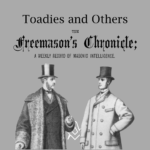 In the realm of Masonry, the principles of equality and respect are paramount. Yet, the presence of toadies—those who obsequiously seek favour from the influential—threatens these ideals. While Masonry embraces diverse beliefs and backgrounds, it rejects the sycophantic behaviours of toadies, flunkeys, and tuft-hunters, urging members to uphold genuine respect and self-worth. The Freemason's Chronicle - 22nd January 1876 |
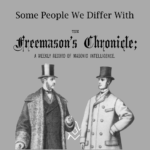 Unveiling the Unpleasant: Some People We Differ With Discover the intriguing dynamics of quarrels within the Masonic brotherhood. From the cantankerous to the litigious, the peevish to the vengeful, delve into the characters that challenge fraternal harmony. Explore their motives, temperaments, and the art of navigating disputes with these fascinating brethren. Brace yourself for a riveting journey into the world of conflicting personalities. |
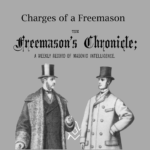 Unravelling the Masonic Mystique: A Deep Dive into the Freemasons' Charges - Explore the intricate world of Freemasonry, its principles, rituals, and the mechanisms for resolving internal disputes. Discover how this ancient fraternity fosters unity, promotes moral conduct, and upholds the sanctity of its secrets, while navigating the complexities of modern society. - The Freemason's Chronicle - 4 December 1875 |
 Unlock the hidden lessons of Masonic Studies! Don't settle for superficial knowledge or mere rituals. Discover the true depth and meaning behind Freemasonry. Expand your understanding of Tracing-Boards, Lectures, and more. Join regular Lodges of Instruction to enhance your Masonic journey. Become a knowledgeable Freemason, not just a token-bearer. Unleash the power of true Masonic wisdom today! |
 Uncover the incredible story of how Masonry saved the life of a Crimean War foot soldier in this historical and masonic account. Through the first hand experience of a soldier engaged in fierce hand-to-hand combat, witness the fateful encounter with a Russian Freemason that changed the course of his life. Learn how brotherhood and a deep dedication to the craft can lead to unforeseen and life-saving circumstances on the battlefield. |
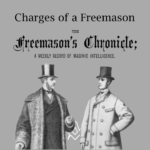 The Freemason's Chronicle - Charges of a Freemason The secrets of Masonry are the exclusive property of the Craft, and can never be communicated to one who is a mere labourer and not an accepted Mason. Hence, no labourer, that is, one who has not been regularly initiated in a legal Lodge. Article first published in The Freemason's Chronicle, 27 November 1875 |
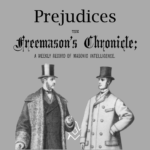 The Freemason's Chronicle - Prejudices Prejudices are partial judgments in favour of, or against certain persons or things, and, for convenience sake, may be ranged in two categories—those which are, comparatively speaking, harmless, and those which are harmful. Article first published in The Freemason's Chronicle, Oct. 2 1875. |
 The Freemason's Chronicle - Cliques Is Freemasonry - a Clique ? Man has been defined as a gregarious animal, but in his highly civilised condition he is gregarious only to a limited extent. First published in The Freemason's Chronicle, Oct. 2 1875, addresses the same challenges then as now. |
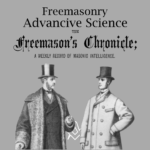 The Freemason's Chronicle - Freemasonry - an Advancive Science Is Freemasonry - an Advancive Science ? Not to confuse advancement with innovation. Has it been the case that Freemasonry's survival for 300 years plus is due to being an Advancive Science, tending to advance. First published in The Freemason's Chronicle 18 September 1875, addresses the same challenges then as now. |
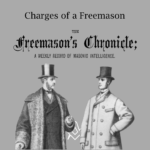 The Freemason's Chronicle - Charges Of A Freemason An interpretation of the "Charges of a Freemason", written Bro. Cornelius Moore and published in 1875, that introduce certain opinions that for some readers, will not sit well in contemporary times. - The Freemason's Chronicle, Sept. 11, 1875 |
 On The Order Of The Temple And Its Doctrine. THE Order of the Temple is divided into two great classes, denominated respectively the Order of the Temple and the Eastern Order. The Eastern Order gave birth to the Order of the Temple, and in the course of time has become an appendage of the latter. It is in ancient Egypt that we find the cradle of the Eastern Order. The Freemason's Chronicle, Sept. 4, 1875 |
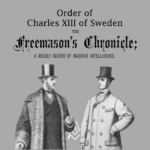 Order of Charles XIII of Sweden The following translation of the Manifesto of King JL Charles XIII of Sweden, on the occasion of his establishing the Masonic Order which bears his name, and of the Statutes of the said Order, may be interesting to our readers. The Freemason's Chronicle, Aug. 28, 1875 |
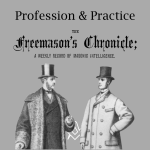 Most of our readers in the course of their experience, have doubtless met with enthusiastic brethren who take it for granted that a Mason can do no wrong. These enthusiasts are thoroughly convinced that the vast majority of those who join the Order are the most benevolent, the most moral, and the very noblest members of society. - The Freemason's Chronicle 10 July 1875 |
 An article investigating the relationship between masonry and citizenship. Are the principles of Freemasonry aligned with the freemason's claim to be a better citizen of the world? The Freemason's Chronicle - 19 June 1875 |
 A visitor must make clear his identity to the satisfaction of the Lodge he proposes to visit. More than once have we been asked to explain our views as to the reception of strangers in a Lodge. - The Freemason's Chronicle - 29 May 1875 |
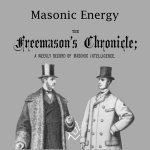 Is there reason in the accusation that Masonic energy looks only to a course of good feeds, when we can point to such grand results as have been achieved in these latter years, both in respect of the extension of our Order ? - 1May 1875 |
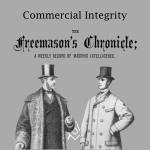 Implementing Freemasonry's peculiar system of morality in our day to day business affairs was the topic of this article, Commercial Integrity, first published in The Freemason's Chronicle - 8 May 1875 |
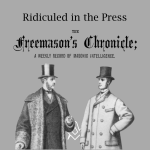 Ridicule has been somewhat illogically described as the test of truth. If it were so, Freemasonry ought to have perished long since. Two press reports from May 1875 covering the |
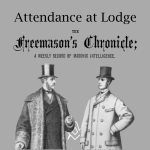 There are many things which Freemasonry will do for a man in the way of opening his mind and giving him larger and kindlier views of life, but Freemasonry itself, cannot eradicate the natural bias of the disposition. |
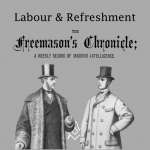 There is, we fear, too marked a tendency in very many Lodges to hasten through its labours, with a view to entering, as soon as possible, upon the business of refreshment. - The Freemason's Chronicle 17th April, 1875 |
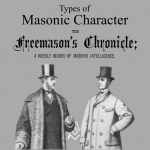 Another example that demonstrates that nothing really changes in Freemasonry. In an article the Types of Masonic Character published 145 years ago in The Freemason's Chronicle 10th April, 1875 |
 A brief history on the relationship between the British Monarchy and the craft - The Freemason's Chronicle 20th March , 1875 |
 What are the qualities of a convivial man and how does this dovetail perfectly in to Freemasonry ? 16th March, 1875 |
 A review of the "Sketch for the History of the Dionysian Artificers," a fragment, by Hyppoli to Joseph Da Costa - This little work may be regarded as, so to speak, the Holy Grail of Masonry. |
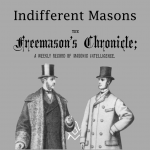 Nothing really changes, an article Indifferent Masons, From Le Monde Maçonnique 1874. Translation published in The Freemason's Chronicle 20th February, 1875 |
 In handling an intruder in the lodge, we endeavoured to show that a good Mason should be a gentleman, and a sincere man. The Freemason's Chronicle 20th February, 1875 |
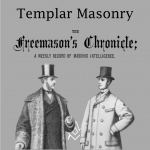 Templar Masonry - a historical aspect of the Religious and Military Order of the Temple published in The Freemason's Chronicle 13th February, 1875 |
 Secrecy perhaps the strongest objection urged by the enemies of the Masonic Order against its existence published in The Freemason's Chronicle 20th March 1875 |
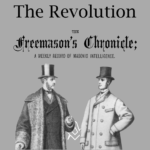 Freemasonry In The United States during And After The Revolution We take a look at Freemasonry in the United States during and after the Revolution first published in The Freemason's Chronicle - February 6, 1875 |
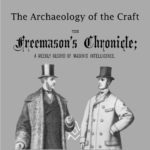 We take a look at the archaeological connection with the Craft, first published in The Freemason's Chronicle - January 30, 1875 |
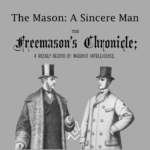 What it means to a Freemason to be a sincere man. Extract: first published in The Freemason's Chronicle - January 23, 1875 |
 What it means to a Freemason to be a citizen of the world ? First published in The Freemason's Chronicle - January 16, 1875 |
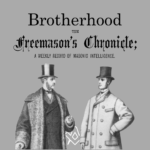 Brotherhood! In that one word what sympathetic associations arise. First published in The Freemason's Chronicle - January 9, 1875 |
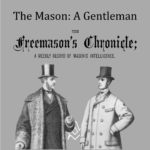 This opening article was written 145 years ago, yet it resonates with Freemasons today as it did then. First published in The Freemason's Chronicle, January 2, 1875, Issue 1 |
masonic knowledge
to be a better citizen of the world
share the square with two brothers

click image to open email app on mobile device



